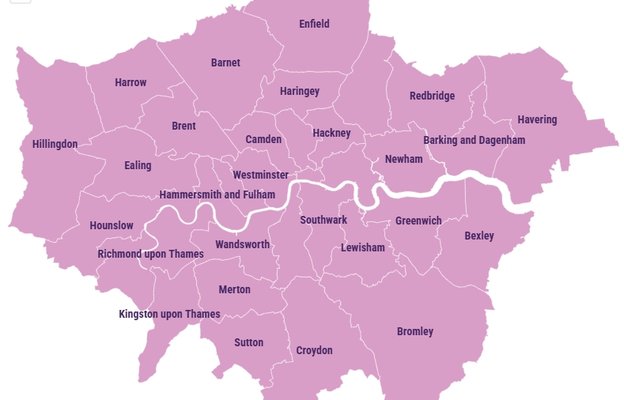
I have a confession. When it feels like we've lost the battle against ideas that divide us, I retreat into my safe space. I live in London - it won’t happen here. There are no flags in my neighbourhood. Our little London bubble will keep us safe.
We all need these safe spaces, but we can’t bury our heads in the sand. The truth is that while Londoners aren’t likely to be seduced by attacks on our diversity, our city will be a battleground if the nation’s politics change in 2029.
Many of us are still in shock. We’re processing the mainstreaming of far-right ideas. But we need to wake up to the threat they pose to Londoners, and for us, specifically how these trends could impact low-income Londoners.
In this blog, I want to look at what these ideas will mean for London if their proponents reach power. It’s speculative - four years is a long time and much will change. Honestly, I hope to look back at this blog in a few years and think, well, that was overdramatic.
It won’t happen here. Why aren’t Londoners attracted to right-wing populism?
Most of us have an intuitive understanding about why London hasn’t seen the same rise in support for right-wing populism as elsewhere. We’re a diverse city, with a younger population than other regions, and many parts of London (though definitely not all) don’t feel ‘left behind’ in the way other parts of the country do.
All of these factors tend to inoculate against right-wing populism. Those same factors probably make London more fertile ground for left-wing populism, something I’ll return to in a future post.
Around 40% of Londoners were born outside of the UK and 46% of Londoners are Black and minority ethnic. People here regularly mix across ethnic lines. And Londoners are less concerned about immigration than the country as a whole - but it’s still important to them, especially when it dominates the news.
And perspectives differ across London. The latest constituency-level poll by YouGov, showing how people would vote in a general election held today, suggests that Reform UK would be clear winners in five London constituencies. The boroughs of Bexley, Bromley, and Havering show strong gains, and Redbridge would see a marginal victory.
The latest constituency-level poll by YouGov, showing how people would vote in a general election held today, suggests that Reform UK would be clear winners in five London constituencies.
These tend to be areas with higher white populations, with lower levels of poverty than the rest of London. They have higher levels of home and car ownership, have traditionally elected Conservative politicians and they voted to leave in the EU referendum.
The local elections in May 2026 will tell us much more about how Londoners are responding to the surge in support for both left- and right-wing populist parties.
The right-wing arms race
Spend five minutes on X/Twitter and you’ll see how London has become a lightning rod for right-wing anger. Crime and multiculturalism are the constant themes.
X/Twitter isn’t representative of public opinion, but it plays an important role in shaping the policies of the online right. Research from academics at the University of Bath shows how platforms like this are shifting the Overton Window – making ideas that were once seen as extreme seem increasingly normal, and providing a pipeline of policy proposals.
The same researchers point to a worrying dynamic, what they call a “right-wing arms race” – influencers and politicians competing to outdo each other with ever more radical ideas.
Research from academics at the University of Bath ... points to a worrying dynamic, what they call a “right-wing arms race” – influencers and politicians competing to outdo each other with ever more radical ideas.
Four years until the next election is plenty of time for things to get better. But it’s also plenty of time for the discourse to escalate to a place we never thought possible. The boundaries of what is acceptable are shifting, and that’s deeply worrying.
If today’s online narratives filter into government policy, what would it mean for London?
What happens in London if a future government adopts more populist or authoritarian policies?
To answer this, we have to deal with what we already know - the issues that dominate and the ideas to tackle them. Much of this could apply to other cities too, but I’ll focus on London, the city I know best.
There is only one place to focus: immigration.
Trust for London has for many decades supported migrant organisations in the city, and for several years have been funding campaigners to end the hostile environment. Right now, this feels like a pipedream.
Being seen to be tough on immigration is a position shared, to varying degrees, by Labour, the Conservatives and Reform. Across these parties, we’re seeing increasingly restrictive proposals, but the most divisive go further, targeting migrants already here legally.
Reform UK has pledged to remove Indefinite Leave to Remain (ILR) and force migrants to reapply for visas every five years, including those already settled. By their own admission, this would strip hundreds of thousands of people of their status.
The implications are staggering, particularly when linked to deportation. Many of those who played by the rules would be caught out by the new system and suddenly become illegal. Reform UK’s Operation Restoring Justice makes it clear deporting illegal migrants will be a central priority.
Professor Alan Manning from the London School of Economics calls their policy ‘detect, detain, deport’. His analysis invokes images of a UK version of Donald Trump’s Immigration and Customs Enforcement (ICE) agents, running around London desperately trying to find people to remove.
The Conservative Party have already announced they would fund an ICE-like ‘removals force’ to increase deportations from 34k to 150k people per year.
Understandably, these policies create genuine fear in migrant communities in London, who fear they will be targeted regardless of their legal status. They are concerned that this will play out in their homes, neighbourhoods and workplaces.
It’s likely their impact will be felt sharpest by those on low and middle incomes, who fall foul of increasingly high salary thresholds for visa applications, or lack the financial capacity to get proper legal advice when the rules suddenly change.
Rising hatred, and what London does next
We’ve seen a rise in antisemitism and anti-Muslim hatred since the October 7th attack and war in Gaza. National and international events play out in communities.
It’s hard to imagine a right-wing populist government being even tougher on immigration without triggering more xenophobia. We’ll hear more talk of extreme ideas, such as the ‘remigration’ of all ethnic minorities proposed by the Homeland Party.
But London has its own forms of resistance. The city’s latent solidarity comes alive in crisis: we saw it during Covid, after Grenfell, and when residents took to the streets of Lewisham to block immigration raids.
Immigration would dominate, but it wouldn’t be the only flashpoint.
Opposition to climate policies is a key pillar of today's right wing populists, including discussions around London's Ultra Low Emission Zone, which has lowered London’s pollution levels to record lows.
But London has its own forms of resistance. The city’s latent solidarity comes alive in crisis: we saw it during Covid, after Grenfell, and when residents took to the streets of Lewisham to block immigration raids.
Reversing this, combined with the Mayor’s likely support for London’s broadly tolerant, multicultural way of life, would likely place City Hall – and London’s civil society - at odds with the direction of central government.
London versus ‘the will of the people’?
Authoritarianism thrives on division. The anti-London sentiment is already primed; it wouldn’t be hard to portray London’s civil society and politicians resisting government policies as going against ‘the will of the people’.
In that climate, it’s feasible the mayoralty could be stripped of power or resources, perhaps emulating the ‘Department of Government Efficient (DOGE)’ approach we’ve seen in America. An authoritarian government might even seek to abolish the role of mayor altogether, as Margaret Thatcher did with the left-wing Greater London Council in the 1980s.
That would be disastrous at a moment when London’s most vulnerable communities would most need reassurance, leadership and hope.
Civil society might fill some of the gap, but not all. And there is the possibility of a crackdown on advocacy by charities, justified by erroneous claims that ‘charities should stay out of politics.’
What civil society can do to prepare
It’s not the role of charities to get involved in party politics. But we must advocate for the people we exist to support, and many of the ideas now circulating would cause real harm to low-income Londoners.
Over the next few years, civil society needs to work with elected political leaders in London to show, using evidence and legal frameworks, the destructive impact these policies would have, especially on low-income communities.
This means we need to strengthen our capacity to use legal protections, something we’ve been doing for several years with the Strategic Legal Fund for migration organisations.
It means placing business voices front and centre, so the economic arguments against divisive policies are clearly understood.
It means placing business voices front and centre, so the economic arguments against divisive policies are clearly understood.
And it means we must invest in alliances, movements, and leadership in the city. Politicians, faith leaders, businesses, charities, universities, and unions working together – coalitions that cross race, faith and class. Authoritarians can silence institutions and charities; but in a democracy they can’t easily silence communities.
We are not alone - this is nothing new
One more confession. In the hours it’s taken to write this, I’ve found myself drifting back toward my safe space, questioning whether any of this would actually happen, whether it would be as bad as I think. But then I ask myself why the words I am typing come so easily.
It’s because it’s already happening, it’s just not here yet. What’s happening in cities like Chicago and Portland in America gives us a window into our possible future.
And while we look on in disbelief, we can take strength that in these places, when authoritarians clamp down, leaders stand up and people come together, as demonstrated by millions who turned out for the ‘No Kings’ marches.
Protecting Londoners in the years ahead will depend on how ready we are to defend the values that hold this city together. Making sure we are ready for that moment - that’s the work ahead of us now.

